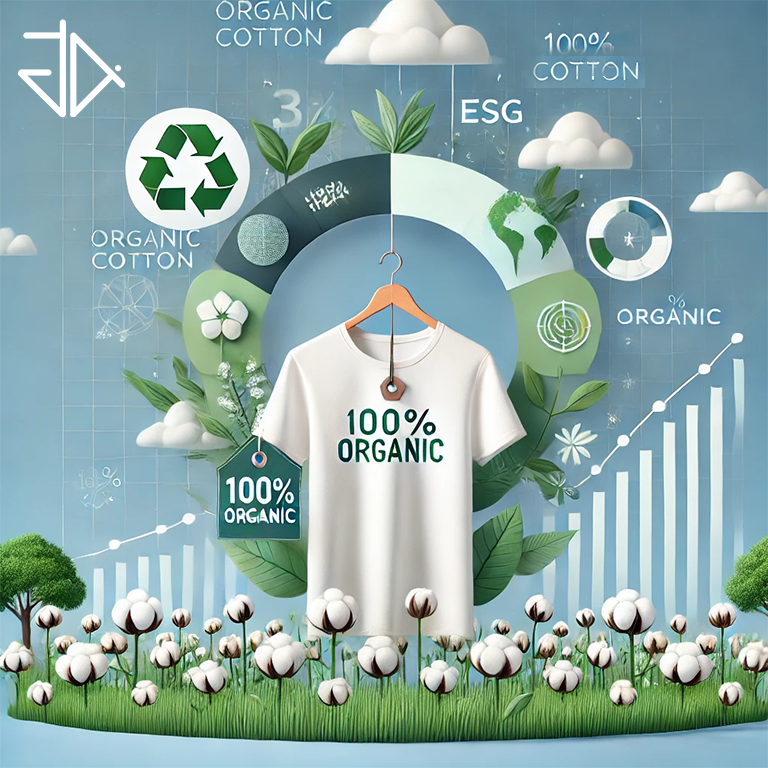
The Benefits of Organic Cotton
Share
As consumers become more conscious of their environmental and social impact, the fashion industry is evolving to meet these expectations. At the forefront of this shift is organic cotton, a sustainable alternative to conventional cotton. Its use not only benefits the planet but also plays a critical role in a brand's Environmental, Social, and Governance (ESG) strategy. Let’s explore the advantages of organic cotton and how it supports ESG values.
What is Organic Cotton?
Organic cotton is grown without the use of synthetic pesticides, herbicides, or genetically modified organisms (GMOs). Instead, it relies on natural processes, such as crop rotation and composting, to enrich the soil and promote biodiversity.
This eco-friendly alternative to conventional cotton offers a range of benefits for the environment, farmers, and consumers, making it an increasingly popular choice in sustainable fashion.
Environmental Benefits of Organic Cotton
-
Reduced Water Usage
Organic cotton farming uses significantly less water than conventional cotton. This is achieved through better soil health, which improves water retention, and the avoidance of chemical fertilisers that often lead to water waste. -
No Harmful Chemicals
By eliminating toxic pesticides and herbicides, organic cotton farming protects the environment from harmful runoff that can pollute rivers and ecosystems. -
Lower Carbon Footprint
Organic cotton production emits fewer greenhouse gases due to the absence of synthetic chemical inputs and the use of manual farming techniques. This helps mitigate climate change and promotes sustainable practices. -
Preservation of Soil Health
Organic farming methods prioritise soil health, reducing erosion and improving fertility. This creates a sustainable system that can support long-term cotton production.
Social Benefits of Organic Cotton
-
Safer Working Conditions for Farmers
Organic cotton farming eliminates exposure to toxic chemicals, improving the health and safety of farmers. This is especially critical in developing regions where protective equipment and healthcare may be limited. -
Fair Wages and Ethical Practices
Many organic cotton certifications, such as GOTS (Global Organic Textile Standard), ensure that farmers are paid fairly and work under ethical conditions. -
Empowering Communities
By supporting organic farming, brands contribute to the economic empowerment of farming communities, enabling them to invest in education, healthcare, and infrastructure.
The Role of Organic Cotton in ESG
1. Environmental Responsibility (E)
Incorporating organic cotton into a clothing line is a tangible way to reduce environmental impact. It demonstrates a commitment to sustainability and aligns with the growing demand for eco-friendly products.
2. Social Impact (S)
Organic cotton supports ethical labour practices, fair wages, and safer working conditions. It showcases a brand’s dedication to improving lives and fostering social equity.
3. Governance (G)
Brands that integrate organic cotton into their operations often adhere to strict certifications and standards. This reflects a commitment to transparency, accountability, and ethical business practices.
Consumer Benefits
-
Healthier Choice
Organic cotton is free from harmful chemicals, making it a safer choice for sensitive skin and those seeking hypoallergenic options. -
Long-Lasting Quality
Organic cotton fibres are stronger and more durable, resulting in clothing that lasts longer, reducing waste in the long term. -
Ethical Assurance
Consumers can feel good about their purchases, knowing they are supporting a sustainable and ethical supply chain.
Conclusion
Choosing organic cotton is more than just a fashion statement—it’s a commitment to a better future. For businesses, it offers a meaningful way to align with ESG goals, reduce environmental impact, and support social equity. For consumers, it provides an opportunity to make more conscious, ethical choices.
At Granite Anchor, we’re committed to incorporating sustainable practices into our operations, including the use of organic cotton in our products. Together, we can create a more sustainable and responsible fashion industry—one stitch at a time.
Let us know your thoughts on organic cotton and its impact! Are you ready to join the movement?
